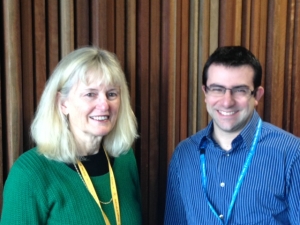Up close and personal
Research news
Loneliness is not necessarily related to the number of close relationships we have, rather it can result when our relationships with others do not meet our expectations.
This was one of the findings outlined at a recent Public Symposium held by Deakin’s School of Psychology to coincide with the International Association for Relationship Research (IARR) Conference, held for the first time in Australia at the Melbourne Convention Centre.
Addressing such universal issues as relationships, loneliness and social support, the IARR Conference was organised in partnership with Deakin’s School of Psychology and is regarded as one of the major world conferences in the field of relationships.
Entitled ‘What has science taught us about relationships?” the public symposium featured six Australian and international experts and attracted a large public audience.
In his address on loneliness, world leading researcher Professor Daniel Russell outlined his findings concerning the physical and psychological outcomes of loneliness, emphasising that “loneliness is not the same as being alone.”
Professor Russell and Professor Carolyn Cutrona, who are both from Iowa State University, have been “Thinkers in Residence” at Deakin for the past three months.
Professor Cutrona focussed her discussion at the symposium on the various types of social support and the outcomes associated with providing support to others.
In her talk, she noted that, contrary to previous beliefs, not all forms of social support lead to positive outcomes for those being supported. Other factors come into play, such as personal pride and how the individual perceives their own situation. In some instances, these factors may contribute towards feelings of inadequacy and ineptitude on behalf of those being supported.
Deakin’s Dr Gery Karantzas, who was Chair of the IARR Conference Organising Committee, discussed what we look for in a romantic partner and the impact of having specific expectations within relationships. He noted gender similarities and differences in the ways men and women choose their long-term partners, based on three key domains of warmth/trustworthiness, vitality/attractiveness and status/resources.
Alfred Deakin Professor Marita McCabe, who chaired the IARR Conference Scientific Program Committee, also highlighted important gender similarities and differences in regard to the ways in which sex effects relationships.
Professor McCabe’s research has demonstrated that sexual dysfunction among men and women may have different and complex origins involving biological, psychological and emotional factors.
Professor Jeffry Simpson, from the University of Minnesota, presented on the question, ‘Do our relationships early in life shape our relationships later in life?’ His landmark research showed an unequivocal “yes,” demonstrating that early attachment at the age of one influences later adult relationships, via developmental pathways, such as peer relations, on the path to adulthood.
Professor Julie Fitness, from Macquarie University, concluded the symposium by posing the question, ‘How do we experience and respond to relationship betrayal?’
Professor Fitness discussed the role of forgiveness, punishment and emotional responses in instances of betrayal within couple relationships. In particular, she highlighted that punishment can have an important function along the road to forgiveness.
Share this story
 Professor Marita McCabe and Dr Gery Karantzas.
Professor Marita McCabe and Dr Gery Karantzas.
